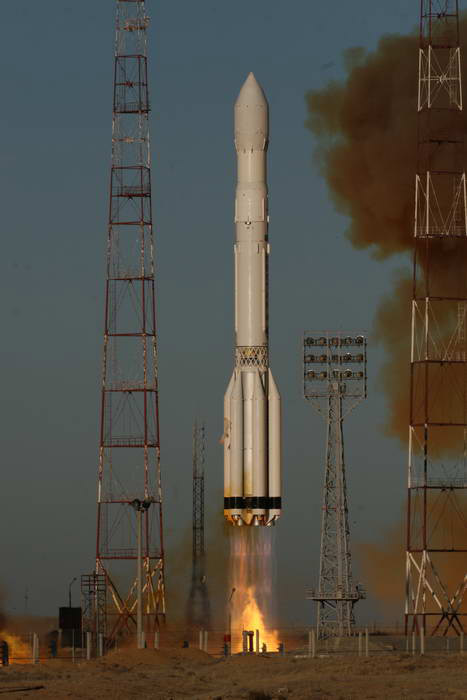Russian Space Officials Punished for Botched Satellite Launch

Russian President Dmitry Medvedev has formally reprimanded the chief of his country's national space agency and fired two other high-ranking space officials over the loss of three state-of-the-art navigation satellites in a botched rocket launch earlier this month.
The decision, announced by the Kremlin today (Dec. 29), comes after an investigation into the Dec. 5 launch failure of a Russian-built Proton rocket carrying three new Glonass-M navigation satellites.
The satellites never reached orbit. Instead, they plunged back to Earth and crashed in the Pacific Ocean north of Hawaii.
A follow-up investigation traced the failure to an embarrassing mistake: Technicians apparently loaded the Proton rocket's Block DM-3 upper stage with between 1,000 and 2,000 kilograms more fuel than planned, which sent the booster off course.
According to the Kremlin statement, Medvedev fired Viktor Remishevsky, deputy chief of Russia's Federal Space Agency, and Vyacheslav Filin, vice president and deputy chief of the rocket manufacturer RSC Energia, after receiving the report on the launch failure investigation.
The two space officials were fired "for the errors made in the calculations for refueling the vehicle's Block DM-3 upper stage," according to the statement.
Medvedev also issued a formal reprimand to Anatoly Perminov, chief of Russia's Federal Space Agency (also known as Roscosmos).
Get the Space.com Newsletter
Breaking space news, the latest updates on rocket launches, skywatching events and more!
"Roscosmos will take additional measures to reinforce disciplinary measures," the statement read.
Soon after the launch failure, Russian investigators traced the cause to the overfueling blunder and cleared the rest of the Proton rocket of any concern.
The Proton rocket fleet successfully returned to flight on Monday (Dec. 27) with the launch of a Ka-Sat broadband communications satellite for Eutelsat.
Russia's Glonass-M satellites perform a navigation service to Russian civilian and military customers similar to U.S. global positioning system satellites. The satellites each weigh just over 3,000 pounds (1,415 kilograms) at liftoff and are designed to last seven years in orbit, according to the satellite fleet manufacturer Information Satellite Systems Reshetnev Co.
There are 26 Glonass satellites in orbit, with two reserved as spares. The satellite constellation is split into three groups of eight craft to provide global coverage.
A new series of Glonass satellite, the Glonass-K series, is currently in development, Russian space officials have said.
- Top 10 Soviet and Russian Space Missions
- Images: 20 Great Rocket Launches
- Russian Satellites Crash Into Pacific Ocean After Failed Launch
You can follow SPACE.com Managing Editor Tariq Malik on Twitter @tariqjmalik.
Join our Space Forums to keep talking space on the latest missions, night sky and more! And if you have a news tip, correction or comment, let us know at: community@space.com.

Tariq is the Editor-in-Chief of Space.com and joined the team in 2001, first as an intern and staff writer, and later as an editor. He covers human spaceflight, exploration and space science, as well as skywatching and entertainment. He became Space.com's Managing Editor in 2009 and Editor-in-Chief in 2019. Before joining Space.com, Tariq was a staff reporter for The Los Angeles Times covering education and city beats in La Habra, Fullerton and Huntington Beach. In October 2022, Tariq received the Harry Kolcum Award for excellence in space reporting from the National Space Club Florida Committee. He is also an Eagle Scout (yes, he has the Space Exploration merit badge) and went to Space Camp four times as a kid and a fifth time as an adult. He has journalism degrees from the University of Southern California and New York University. You can find Tariq at Space.com and as the co-host to the This Week In Space podcast with space historian Rod Pyle on the TWiT network. To see his latest project, you can follow Tariq on Twitter @tariqjmalik.









